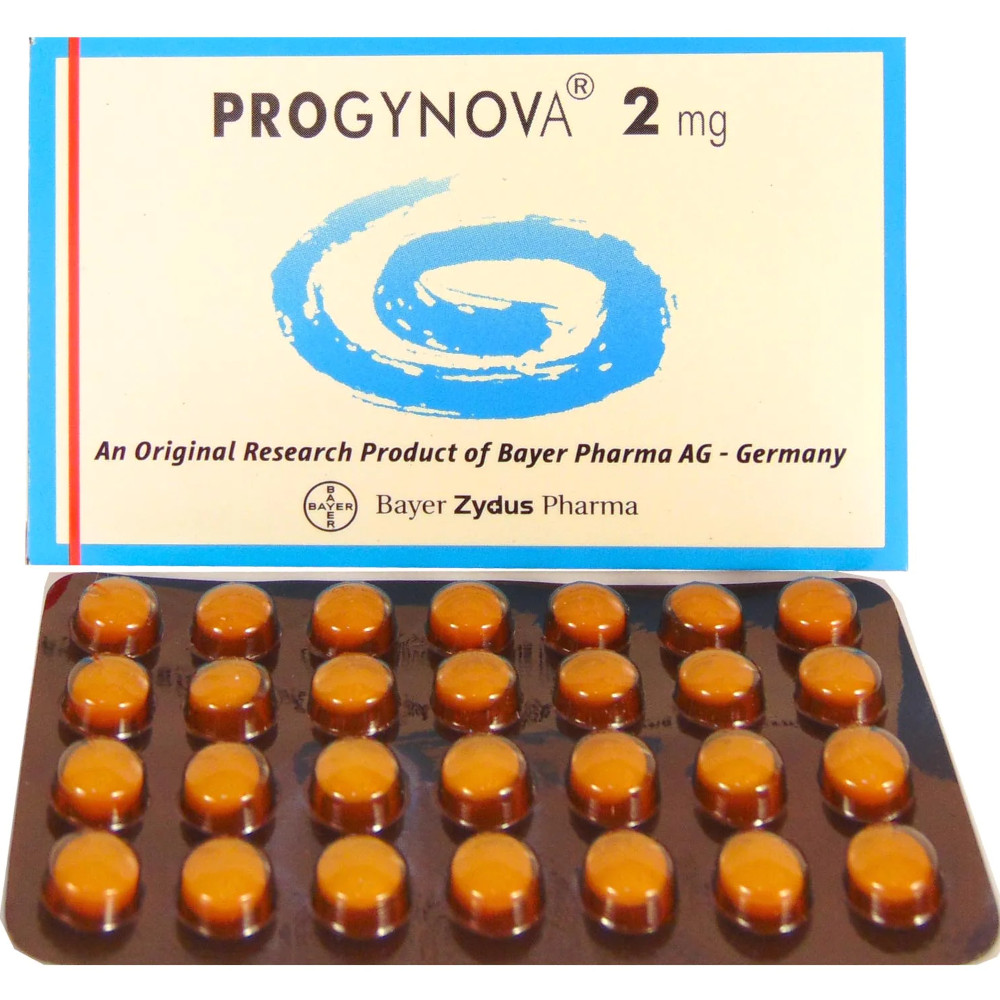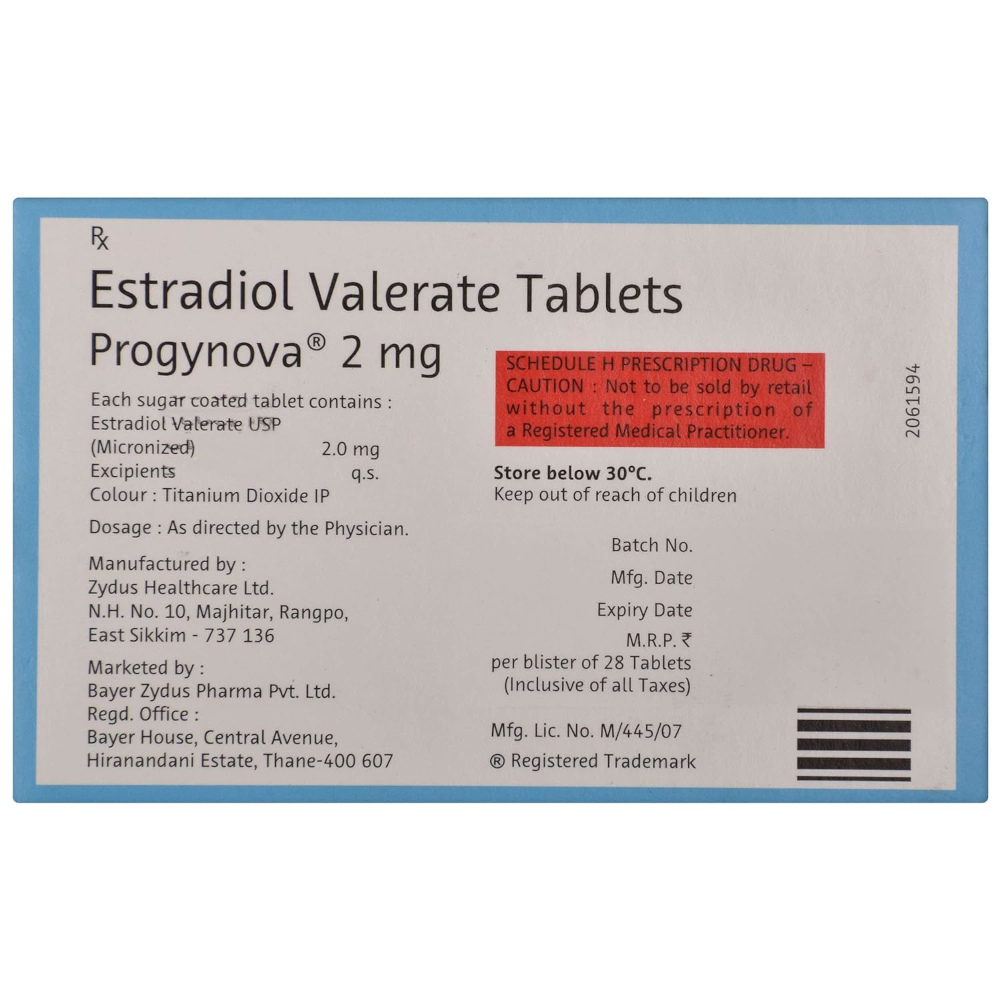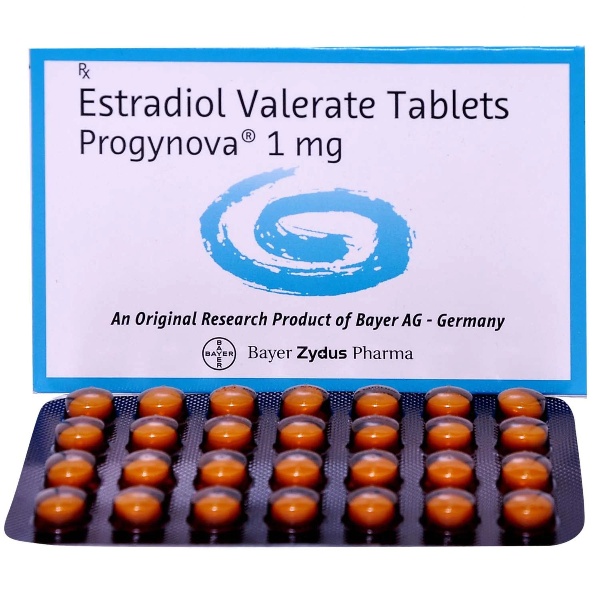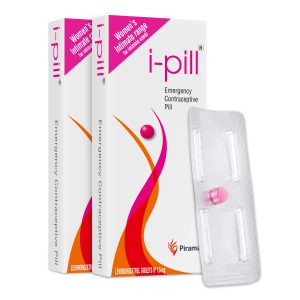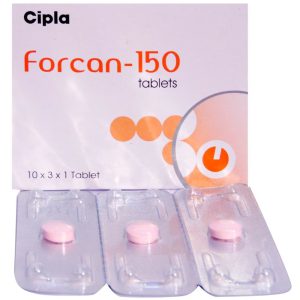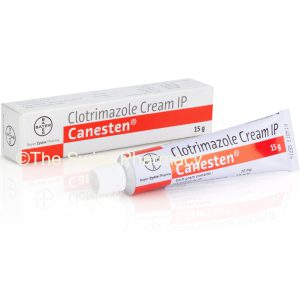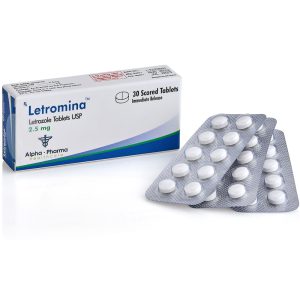Progynova Tablets – Product Information
PROGYNOVA provides hormone replacement therapy for the treatment of menopausal complaints after the cessation of monthly bleeding or after removal of the ovaries (ovariectomy).
We also stock Osteofos (Generic Alendronate Sodium 10 mg, 35 mg and 70 mg Tablets) is used for the treatment and prevention of osteoporosis in postmenopausal women.
Name of Drug
PROGYNOVA 1 packet contains 28 pills. (Also known as FemTab).
Manufacturer
Zydus Healthcare (Marketed in India by Bayer Pharmaceuticals Pvt. Ltd. (Bayer Zydus Pharma))
Website: www.bayer.in
.
Active Pharmaceutical Ingredient
The active pharmaceutical ingredient present in Progynova Tablets is Estradiol Valerate.
Drug Uses
PROGYNOVA is intended for hormone replacement therapy (HRT). Each blister pack of PROGYNOVA contains 28 sugar-coated tablets, each containing 1.0mg estradiol valerate (beige tablet) or 2.0mg estradiol valerate as active substance.
Progynova Tablets – Dosage
PROGYNOVA contains estradiol valerate, a prodrug of the natural human estradiol. During menopause (‘the change of life’) the estradiol production of the ovaries declines. Although the change of life is natural, it often causes distressing symptoms, which are connected with the gradual loss of the hormones produced by the ovaries.
PROGYNOVA replaces the hormone estradiol that the body no longer makes. The estradiol prevents or relieves troublesome symptoms (menopausal complaints) such as hot flushes, sweats, sleep disturbances, nervousness, irritability, dizziness, headaches, as well as involuntary loss of urine, vaginal dryness and burning, and pain during sexual intercourse.
The use of estrogens alone over a prolonged period can lead to the excessive development of the lining of the womb and, in this connection, can increase the incidence of cancer of the womb. This increase in risk can be avoided by the additional administration of a progestogen. This results in regular shedding of the lining of the womb and, therefore, menstruation-like bleeding. If you have not had a hysterectomy (removal of the uterus/womb), your doctor should prescribe a progestogen hormone for you to take while you are taking PROGYNOVA.
In addition, the loss of the hormones produced by the ovaries leads to thinning of the bones. In some women this effect may be extensive (postmenopausal osteoporosis) resulting in fractures of the bones in later life.
How to use PROGYNOVA properly
- Each pack covers 28 days of treatment. You have to take one tablet daily.
- If you still have your monthly periods you should start PROGYNOVA tablets within the first 5 days of menstruation.
- In any other case your doctor may advise you to start immediately.
- If you have not had a hysterectomy (removal of the uterus/womb), your doctor will prescribe an additional progestogen hormone and will advise you how to take this.
It does not matter at what time of the day you take your tablet, but once you have selected a particular time you should keep to it every day. The tablet should be swallowed whole with some liquid. When you have finished each pack start the next pack on the following day. Never leave a break between packs. Tablet taking should be continuous.
Please observe these instructions for use, otherwise you will not fully benefit from PROGYNOVA.
Drug Class and Mechanism
PROGYNOVA provides hormone replacement therapy for the treatment of menopausal complaints after the cessation of monthly bleeding or after removal of the ovaries (ovariectomy).
Some women are more likely than others to develop osteoporosis in later life depending on their medical history and lifestyle. If it is appropriate, you may be prescribed PROGYNOVA to prevent osteoporosis. Your doctor will be able to advise you further.
Storage Information for Progynova Tablets
Do not useProgynova Tablets after the expiry date stated on the package.
Store all drugs properly and keep them out of reach of children.
Warnings and Precautions to be taken when using Progynova Tablets
Do not use PROGYNOVA if you have any of the conditions listed below. If any of these apply to you, tell your doctor who will be able to advise you further.
You must not use PROGYNOVA if:
- you are pregnant or breast-feeding
- you have undiagnosed vaginal bleeding
- you recently had a heart attack and/or stroke
- you have or there is a suspicion of cancer of the breast
- you have or there is a suspicion of other cancers influenced by sex hormones
- you have or have had a liver tumour (benign or malignant)
- you have severe liver disease
- you have or have had a thrombosis (the formation of a blood clot) in the blood vessels of the legs (deep venous thrombosis) or the lungs (pulmonary embolism) or thrombophlebitis (inflammation of a vein)
- you have an inherited or acquired predisposition to venous thrombosis (formation of a blood clot in a vein) e.g. antithrombin III deficiency
- you have severely elevated blood levels of triglycerides (special type of blood lipids)
- you are allergic to any of the ingredients of PROGYNOVA.
If any of these conditions appear for the first time while using PROGYNOVA, stop taking it at once and consult your doctor.
Tell your doctor if:
If HRT is used in the presence of any of the conditions listed below or they appear for the first time, recur or worsen during treatment, you may need to be kept under close observation. Your doctor can explain this to you. Therefore, tell your doctor before starting to use PROGYNOVA if:
you have an increased risk of thrombosis (blood clot formation) in your veins; the risk increases with age and may also be higher:
- if anyone in your immediate family has ever had a thrombosis in the blood vessels of the legs or lungs
- if you are overweight
- if you have severe varicose veins
- you have fibroids of the womb
- you have or have had endometriosis (the presence of tissue of the lining of the womb in places in the body where it is not normally found)
- you have liver or gall-bladder disease
- you have had jaundice during pregnancy or previous use of sex steroids
- you suffer from diabetes
- you have moderately elevated levels of triglycerides (a special type of blood lipids)
- you have high blood levels of calcium (hypercalcaemia)
- you have high blood pressure
- you have or have had chloasma (yellow brown pigmentation patches on the skin, particularly of the face); if so, avoid too much exposure to the sun or ultraviolet radiation
- you suffer from epilepsy
- you have lumpy or painful breasts (benign breast disease)
- you suffer from asthma
- you suffer from migraine
- you have the inherited disease called porphyria
- you suffer from inherited deafness (otosclerosis)
- you have systemic lupus erythematosus (SLE; a disease affecting the skin all over the body)
- you suffer from chorea minor (Sydenham’s chorea)
If you are already using PROGYNOVA, tell your doctor well in advance of any expected hospitalisation or surgery. This is because the risk of deep venous thrombosis is temporarily increased as a result of an operation or immobilisation (for example, when you have your leg or legs in plaster or splints) and may be further increased by the use of PROGYNOVA. Your doctor may tell you to stop taking PROGYNOVA several weeks before surgery or at the time of immobilisation. Your doctor will also tell you when you can start taking PROGYNOVA again after you are back on your feet.
What else you should know
PROGYNOVA cannot be used as a contraceptive.
If you still have the ability to become pregnant, PROGYNOVA is unlikely to alter it. If you are taking contraceptive precautions other than oral (or other hormonal) contraceptives when you start PROGYNOVA, continue to do so until your doctor tells you that you no longer require contraceptive protection. If you have been taking an oral (or other hormonal) contraceptive, you must change to a non-hormonal form of contraception (but not the rhythm or temperature methods) before starting PROGYNOVA. However, if your doctor has already advised you that you need no longer use any contraceptive, you need not do so while taking PROGYNOVA.
The use of hormone replacement therapy (HRT) can increase the risk of a blood clot occurring in the deep veins of the legs. This is known as deep venous thrombosis. Blood clots occur rarely and can develop whether or not you are taking HRT. Very occasionally, such as when a blood clot breaks away from the veins and blocks the arteries of the lungs (pulmonary embolism), a blood clot may cause serious permanent disability or may even be fatal. The warning signs of a blood clot are listed under the section "When using PROGYNOVA".
Oestrogens with or without progestogens should not be used for the long-term maintenance of general health, including the primary prevention of cardiovascular disease as the risks of long-term treatment with HRT, in most circumstances, outweigh the benefits.
All prospective and current users of HRT should be advised of the risks and benefits of oestrogens and progestogens and the need for treatment with HRT should be reviewed on a yearly basis.
If there is a suspicion of an adenoma of the anterior lobe of the pituitary gland, this should be ruled out by your doctor before starting treatment.
Your doctor will carry out gynaecological, blood pressure and other examinations as appropriate. Your doctor will examine your breasts periodically during treatment, particularly if there is a history of breast cancer in your family. If you are known to have any liver disease, your doctor will arrange for your liver function to be checked periodically.
HRT and cancer
The risk of cancer of the lining of the womb (endometrial cancer) increases when estrogens are used alone for prolonged periods. Estrogen treatments such as PROGYNOVA should not be used alone in women who have not had a hysterectomy. If you are using PROGYNOVA and have not had a hysterectomy, you will need additional progestogen hormone treatment. Your doctor will advise you about this. Please inform your doctor if you frequently have bleeding irregularities or persistent bleeding during treatment with PROGYNOVA.
In clinical studies breast cancer has been found slightly more often in women who have used HRT for several years compared to women of the same age who have never used HRT. The risk of having breast cancer diagnosed increases with length of treatment but this is comparable to the increased risk observed in women with a delayed menopause. If women stop taking HRT this increased risk decreases so that 5 years after stopping HRT, the risk of finding breast cancer is the same as for women who have never used HRT. Breast cancer seems less likely to have spread when found in women who have used HRT compared to women who have never used HRT. It is not known whether the difference is caused by HRT. It may be that women using HRT are examined more often, so that breast cancer is noticed earlier.
Ovarian cancer has been reported to occur slightly more often in women who had been on estrogen therapy for longer than 10 years; however, a survey of 15 studies did not find an increased risk for women on estrogen therapy.
During or after the use of hormones such as those that are contained in PROGYNOVA, benign liver tumors have rarely occurred, and malignant liver tumors even more rarely. In isolated cases, bleeding from such tumours into the abdominal cavity has endangered life. Although such events are extremely improbable, you should inform your doctor about any unusual feelings in your upper abdomen that do not disappear within a short time.
Missed Dose
If you are less than 24 hours late, take it as soon as possible, and take the next one at your normal time.
If you discontinue tablet taking for several days, irregular bleeding may occur.
Possible Side Effects of Progynova Tablets
Serious reactions associated with the use of HRT preparations such as PROGYNOVA, as well as the related symptoms, are described in the sections "Before you use PROGYNOVA" and "When using PROGYNOVA". Please read these sections carefully and consult your doctor where appropriate.
During the first few months of treatment you may experience some breast tenderness or enlargement. These symptoms are usually temporary and normally disappear with continued treatment. If they do not, contact your doctor.
The following symptoms, which may or may not have been caused by HRT, and which in some cases were probably symptoms of the menopause, have been reported in users of various oral HRT preparations:
- Reproductive system and breast disorders: changes in vaginal bleeding pattern and abnormal bleeding or flow, breakthrough bleeding, spotting (bleeding irregularities usually subside during continued treatment); dysmenorrhoea (painful menstruation), changes of vaginal secretion, premenstrual-like syndrome, breast pain, tenderness or enlargement
- Gastrointestinal disorders: dyspepsia (indigestion), bloating, nausea, vomiting, abdominal pain
- Skin and subcutaneous tissue disorders: rashes, various skin disorders (including pruritus, eczema, urticaria, acne, hirsutism, hair loss, erythema nodosum)
- Nervous system disorders: headache, migraine, dizziness, anxiety/depressive symptoms, fatigue
- Miscellaneous: palpitations, oedema, muscle cramps, changes in body weight, increased appetite, changes in libido (sexual drive), visual disturbances, intolerance to contact lenses, hypersensitivity reaction.
If you notice any unwanted effects not mentioned in this leaflet, or if you are unsure about the effect of this product, please inform your doctor or pharmacist.
Buy Progynova Tablets 2 mg and 1 mg Online
You can buy Progynova Tablets online from the Swiss Pharmacy. It is available in pills of 2 mg and 1 mg. The 2 mg pills are priced at only $23.50 per packet of 28 pills if you place an order for 10 packets whereas the 1 mg tablets are available for $14.90 per packet of 28 pills if you place an order for 10 packets.


